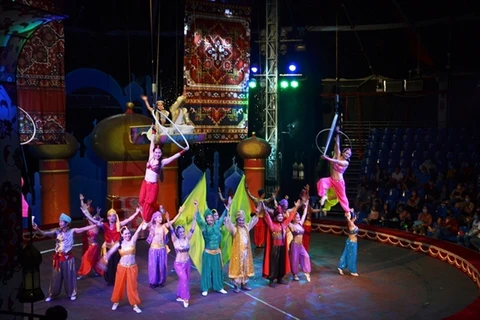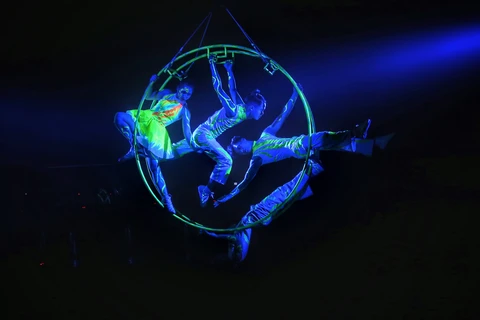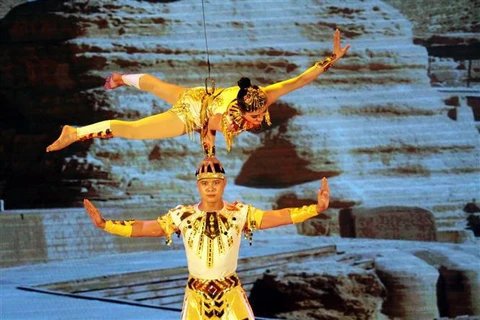 Circus is not only a spiritual food of Vietnamese people but also an art that carries international languages, bringing Vietnam and the rest of the world closer together. (Photo: VNA)
Circus is not only a spiritual food of Vietnamese people but also an art that carries international languages, bringing Vietnam and the rest of the world closer together. (Photo: VNA) Hanoi (VNA) - From foreign origins, over the past 100 years, the circus has been fostered by many generations of Vietnamese actors, artists and directors with many colours and features bearing the characteristics of the national culture.
Circus is not only a spiritual food of Vietnamese people but also an art that carries international languages, bringing Vietnam and the rest of the world closer together.
Vietnamese circus has become famous internationally, even in countries with a long history of the art, such as Russia and China, becoming a messenger of Vietnamese culture and art abroad.
Father of the circus industry and the first "bricks"
People's artist Ta Duy Anh, Director of the Vietnam Circus Federation, showed the old family photos and could not hide his excitement and pride in the family tradition. He is the grandson of people’s artist Ta Duy Hien (1889-1967), who made great contributions to creating the Vietnamese circus industry 100 years ago.
Hien collected the first "bricks" to build the first circuses in Vietnam. He also helped train "key" actors who have made the Vietnamese circus thrive on the S-shaped land and become famous in many countries worldwide.
In the early 20th century, many famous foreign circuses came to Vietnam, including those from China, Japan, the UK, Mexico and the Philippines. They attracted large audiences thanks to their novel, attractive and risky circus acts.
In response to that event, domestic circus actors gathered together to set up circuses in all regions of the country. While these troupes all had personal names, such as André Than circus in Sa Dec (1917), Nam Tu circus in My Tho (1918) and Sau Gun circus in the South (1919), Ta Duy Hien gave his "brainchild" a name containing national pride, Vietnam Circus.
After the August Revolution in 1945, Hien gathered other circuses in the northern region to establish the Thong Nhat Circus, led by him. The Thong Nhat Circus then became the Central People's Circus in 1959 and the Vietnam Circus Federation in 1978.
From 1956 to 1975 when the country was reunified, Vietnamese circus thrived in quantity and quality, meeting the requirements of the national construction and the fight to defend the Fatherland. In 1962, Vietnamese circus reached out to the world, successfully performing in Eastern Europe and several friend countries such as China, the Democratic People's Republic of Korea and Mongolia. It also participated in many international circus competitions in Cuba, the Soviet Union and China.
Continuing to write the history of Vietnamese circus
Since the first chapter of the circus industry, many descendants of people's artist Ta Duy Hien have continued to write the glorious history of the family, contributing to making Vietnamese circus famous worldwide. They are meritorious artists Ta Duy Nhan, Ta Duy Hung, Ta Duy Khanh, Ta Duy Ky, Ta Thuy Ngoc and Ta Thuy Hoi; actress Ta Mai Anh, actress Ta Thuy Phuong, and actor Ta Duy Kien; and people's artist Ta Duy Anh.
Anh was born and grew up in a "dense" circus atmosphere. He was too familiar with the animals, circus props and training moments of his parents and family members. Therefore, his love for circus came very naturally.
Although he was not directly taught by his grandfather Ta Duy Hien, Anh has learned many valuable moral lessons from him.
"My grandfather left for me hard work, patience, and self-sacrifice. Without these elements, I could not pursue the circus. I have imparted his circus techniques indirectly through my father - meritorious artist Ta Duy Hung, because my father is the 'true disciple' of my grandfather," he said.
Efforts to revive circus industry
In the 80s and 90s of the last century, Vietnamese circus fell into a decline for many reasons. The market mechanism made the artists struggle to find a direction. It was in danger of disbanding as internal conflicts emerged and many actors quit their jobs.
At that time, Resolution No. 03-NQ/TW, issued on July 16, 1998, by the 8th Party Central Committee at its 5th plenum, on building and developing an advanced Vietnamese culture imbued with national identity, immediately breathed new vitality into Vietnamese circus.
Since 2000, Vietnamese circus has constantly explored, innovated, actively participated in international festivals, and won many high prizes, affirming its position in the world.
People's artist Ta Duy Anh said his generation is luckier than the previous ones as the Vietnam Circus Federation has received great attention from the Party and State.
"I have performed with actors to serve soldiers and people across the country, including those in border areas and islands. We have also made many overseas performance tours and attended a range of international circus festivals, creating a big echo for the Vietnamese circus," he said proudly.
"Circus is an art of foreign origin but it has been localised to become a part of Vietnamese culture. We have focused on developing a modern circus with Vietnamese characteristics, to promote the art at home and introduce the Vietnamese culture and people to international friends through the top-notch circus art," said Anh./.






















